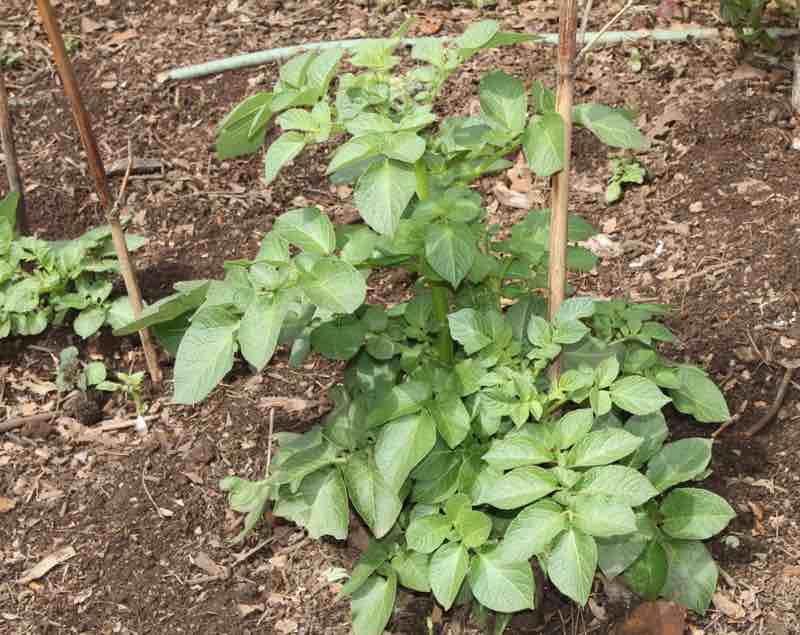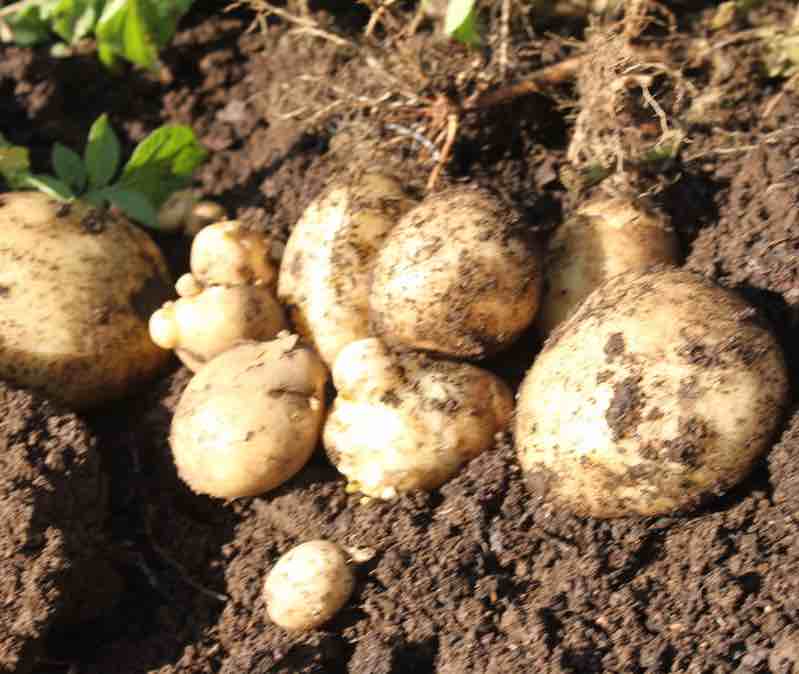- Bernard Preston homepage
- Our green garden
- Old Potatoes
Old potatoes
Old potatoes go soft and horrid but they are perfect for seed to be planted in your green garden; they will bring you in a wonderful crop of new-spuds.
An excellent snippet by Katy Rose in the Witness on reducing food-waste got me thinking about old potatoes. Last week I wrote concerning the huge crop we have this year, grown from straggly old spuds planted randomly around the garden, successfully thwarting the moles.

Last year potatoes reaped from the garden were kept in the dark in a cardboard box, eked out because of the mole problem; then we bought a pocket and the old container was forgotten. Imagine my surprise this spring when tidying up in the garage to find it, full of dried-up spuds with long skinny shoots searching for light and water.
They were destined for the worm-farms when suddenly I thought that it could not do any harm to plant them. And now what's potting in the summer garden? Reaping new potatoes is hard work. Never start before doing our simple lower back exercises[2].
We stake them incidentally, to tie up the fronds and so you can find them after the haulm dies back.
So small holes were dug, scattered randomly about the garden, a little vermicompost from the worm farms; some in between the hydrangeas, hoping to hide from the moles; perhaps fifty or more very tired-looking old potatoes. And this year we have one of the biggest crops ever.
Katy Rose is right; we throw away far too much good-food. And old onions and potatoes are perfect for the garden with huge savings; we have not had to buy chats for planting; and they are difficult to get in any case at the best of times. We won’t be purchasing spuds for months this year.
Every night we enjoy a couple new potatoes for supper. Another advantage is that they don’t give the blood sugar surge of those from cold storage; that is why the banters are forbidden to eat them. These spuds have "resistant starch," the molecules configured such that it is difficult for the enzymes in the gut to digest them forming glucose.
Instead much reaches the colon for the teeming host known as the microbiota to feed on, forming important short-chain fatty acids instead of glucose.
At a recent lecture given in Howick, Prof Nola Dippenaar spoke of the importance of the microbiota which apparently weighs an incredible 2kg of bugs; we have 10 times as many bacteria, viruses and yeast-cells in our gastrointestinal tract as human ones in our whole bodies.
Researchers are now calling the microbiota the "second brain" because of the profound effect that this host has on neurotransmitters in the body; and consequently the degenerative conditions like Alzheimer's disease.
So it’s not such an exaggeration to say that planting an old mouldy potato could influence whether we go senile or not. On that note I was saddened by a recent article in the Witness suggesting that because we were highly likely to lose our marbles, we had better start saving for the day when we would be dumped in a home by our children whom we would not even recognise.
There was no mention of what we might do to lessen the chances of that scenario unfolding; like planting old potatoes. Prevention is better than a cure is a much trotted-out slogan but largely ignored in practice.
Old potatoes
Old potatoes can easily be planted if you have a large garden instead of sending them to the dump, or even the compost heap.
In just a few months you could be enjoying priceless new potatoes, freshly-dug from the garden.

There is no doubt that potatoes from cold-storage are problematic; depending on how they are prepared they usually have a very high glycemic index. That means they give us a blood glucose rush, contributing to diabetes and obesity; especially french fries.
Part of the solution is to understand what is meant by resistant starch and net carbs. Much of the fibre in our food is not digested but gives the stool bulk and feeds the microbiota; both are extremely important for our wellness.
If you want to eat potatoes but not become obese, then learn too about retrogradation of starches; after cooking, cool them in the refrigerator and then reheat them. The molecules reconfigure themselves in a spiral making it difficult for the enzymes to digest.
Biochemistry is an extremely complicated subject. Even the so-called experts frequently have vehemently different opinions, especially over the roles of carbs in our food.
Just take honey, for example. That from your local beekeeper which is unprocessed, surprisingly (since it consists of simple sugars) has a really low glycemic index; but once the bottling companies have got hold of it, the GI rises dramatically[1].
It's the same with potatoes. From cold-storage they give a blood glucose surge but not from your garden; especially if you know about retrogradation.
Boil the potatoes for Sunday's braai on Saturday and cool them overnight; it's not such a schlep.
Smoothies

I wonder how this nutritious green smoothie would taste using a bit of cooked new-potato instead of banana?
I so miss the bananas my grandparents once grew; today those ripened by modern agriculture are so second-rate. This weight loss research explains why we should treat the starches from the food industry with such disdain.
Carbs are made up of three types; sugar, fibre and starch.
I am utterly convinced that growing and enjoying their own food is central to what contributes so greatly to blue zone longevity; the five places in the world where reaching ninety still in full swing is the norm.
Is it ok to eat old potatoes?
Actually it usually not ok to eat old potatoes that have gone soft or have a mouldy smell[3]. Don't toss them though, plant them in the garden. In a few months' time you will have dozens of excellent spuds.
The older they get the greater the amount of rapidly absorbed starch; they are more fattening. That's why we avoid any potato even if it looks fine from cold storage. If you are prediabetic they will spike your blood glucose; test yourself.
- Glycemic properties of some German honey varieties
- Core lower back exercises. Web: https://www.youtube.com/watch?v=-Yit9MZ7WeE
- Can You Eat Sprouted Potatoes?
When browsing use right click and Open Link in New Tab, or you may get a bad gateway signal.
Newsletter
Our newsletter is entitled "create a cyan zone" at your home, preserving both yourself and Mother Earth for future generations; and the family too, of course. We promise not to spam you with daily emails promoting various products. You may get an occasional nudge to buy one of my books.
Here are the back issues.
- Lifestyle and ideal body weight
- What are ultra-processed foods?
- Investing in long-term health
- Diseases from plastic exposure
- Intensive lifestyle management for obesity has limited value
- A world largely devoid of Parkinson's Disease
- The impact of friendly bacteria in the tum on the prevention of cancer
- There's a hole in the bucket
- Everyone is talking about weight loss drugs
- Pull the sweet tooth
- If you suffer from heartburn plant a susu
- Refined maize meal and stunting
- Should agriculture and industry get priority for water and electricity?
- Nature is calling
- Mill your own flour
- Bake your own sourdough bread
- Microplastics from our water
- Alternative types of water storage
- Wear your clothes out
- Comfort foods
- Create a bee-friendly environment
- Go to bed slightly hungry
- Keep bees
- Blue zone folk are religious
- Reduce plastic waste
- Family is important
- What can go in compost?
- Grow broad beans for longevity
- Harvest and store sunshine
- Blue zone exercise
- Harvest and store your rainwater
- Create a cyan zone at your home
Did you find this page interesting? How about forwarding it to a friendly book or food junkie? Better still, a social media tick would help.
- Bernard Preston homepage
- Our green garden
- Old Potatoes
Address:
56 Groenekloof Rd,
Hilton, KZN
South Africa
Website:
https://www.bernard-preston.com